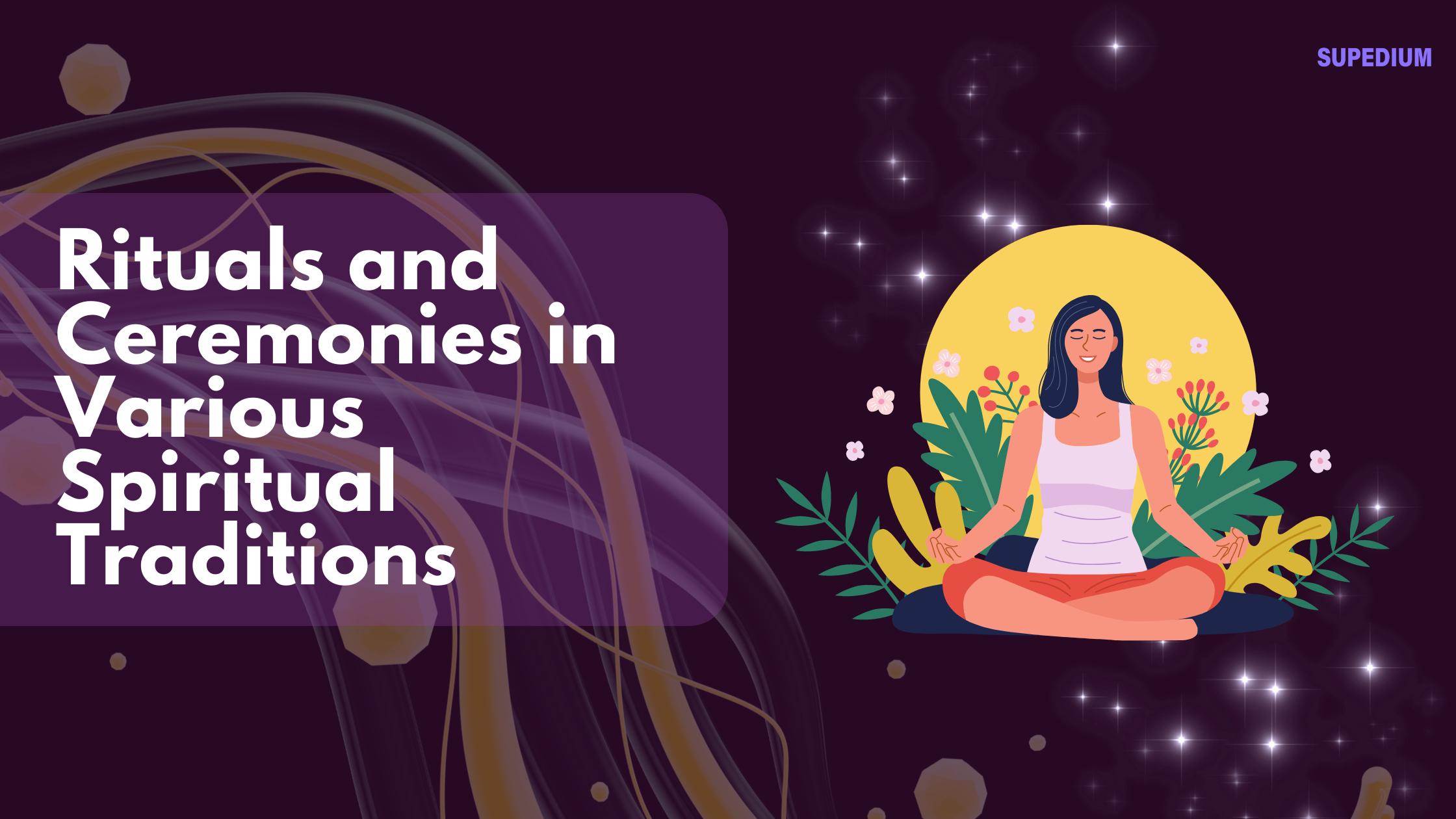Table of Contents
![]()
Introduction
Rituals and ceremonies are integral components of spiritual traditions worldwide, serving as structured practices that convey deep symbolic meanings. Rituals often involve repetitive actions imbued with spiritual significance, while ceremonies are formal acts that mark significant events or transitions in life. Both practices are crucial in expressing and preserving cultural and religious identities, fostering community cohesion, and facilitating personal and collective transformation.
Major Spiritual Traditions and Their Rituals
Hinduism
Daily Rituals (Puja) In Hinduism, daily rituals, known as Puja, involve offering prayers, food, and flowers to deities. This ritual practice is central to worship and varies from simple home-based rituals to elaborate temple ceremonies. Puja includes the recitation of mantras and hymns, creating a sacred space for devotees to connect with divine presence.
Life Cycle Ceremonies Hindu life cycle ceremonies, or Samskaras, are rites of passage marking significant life stages:
- Namkaran: The naming ceremony performed shortly after birth, symbolizing the infant’s entry into the community.
- Upanayana: The sacred thread ceremony, marking the transition from childhood to adulthood and the start of formal education.
- Vivaha: The marriage ritual, a significant cultural event that unites families and involves elaborate ceremonies and rituals.
- Antyesti: The funeral rites, which ensure the smooth transition of the soul to the afterlife.
Festivals Hindu festivals celebrate various deities and seasons:
- Diwali: Known as the Festival of Lights, it symbolizes the victory of light over darkness and good over evil.
- Holi: The Festival of Colors celebrates the arrival of spring and the victory of devotion over evil.
- Navaratri: A nine-night festival dedicated to the goddess Durga, involving fasting, prayer, and dance.
Buddhism
Daily Practices Buddhist daily practices focus on mindfulness and meditation. Practitioners engage in meditation sessions to cultivate inner peace and insight, often accompanied by chanting mantras and reciting sutras.
Life Transitions Key Buddhist life transitions include:
- Ordination: Becoming a monk or nun, which involves a formal ceremony where individuals take vows and receive a new monastic name.
- Death and Rebirth Rituals: Rituals that guide the deceased through the bardo, the intermediate state between death and rebirth, aiming to secure a favorable rebirth.
Festivals Buddhist festivals commemorate important events in the life of the Buddha:
- Vesak: Celebrates the birth, enlightenment, and death of the Buddha, marked by offerings, meditation, and community events.
- Losar: The Tibetan New Year, featuring traditional rituals, dances, and feasts.
- Obon: A Japanese festival honoring ancestral spirits, involving lantern festivals and family gatherings.
Christianity
Sacraments Christianity recognizes several sacraments, which are sacred rites considered essential for spiritual life:
- Baptism: The rite of initiation into the Christian faith, symbolizing purification and rebirth.
- Eucharist: Also known as Communion, it involves partaking of bread and wine to commemorate the Last Supper of Jesus.
- Confirmation: A rite of passage affirming one’s faith and full membership in the church.
- Marriage: A sacrament that unites a couple in the eyes of God.
- Penance: Also known as Confession, this sacrament involves repentance and forgiveness of sins.
- Anointing of the Sick: Provides spiritual healing and comfort to the ill.
Liturgical Calendar The Christian liturgical calendar outlines significant religious seasons and celebrations:
- Advent: The period leading up to Christmas, focusing on anticipation and preparation.
- Christmas: Celebrates the birth of Jesus Christ.
- Lent: A season of fasting and penance leading up to Easter.
- Easter: Commemorates the resurrection of Jesus.
- Pentecost: Marks the descent of the Holy Spirit upon the apostles.
Rituals and Ceremonies Christian rituals include:
- Daily Prayers: Regular prayers that foster personal connection with God.
- Church Services: Weekly gatherings for worship, scripture readings, and communal prayer.
- Pilgrimages: Journeys to sacred sites, such as the Holy Land, for spiritual reflection and growth.
Islam
Five Pillars of Islam The Five Pillars are fundamental acts of worship and practice in Islam:
- Shahada: The declaration of faith, affirming the oneness of God and the prophethood of Muhammad.
- Salat: The five daily prayers, performed at prescribed times throughout the day.
- Zakat: Almsgiving to assist the less fortunate and purify wealth.
- Sawm: Fasting during the month of Ramadan, which involves abstaining from food, drink, and other physical needs from dawn until dusk.
- Hajj: The pilgrimage to Mecca, an obligatory journey for Muslims who are physically and financially able.
Daily Rituals Islamic daily rituals include:
- Salah: Performing the five daily prayers facing Mecca.
- Qur’an Recitation: Reading or reciting verses from the Qur’an as a form of worship and reflection.
Festivals Islamic festivals celebrate key religious milestones:
- Eid al-Fitr: Marks the end of Ramadan with festive meals and communal prayers.
- Eid al-Adha: Commemorates Abraham’s willingness to sacrifice his son and involves the ritual sacrifice of animals.
Judaism
Lifecycle Events Jewish lifecycle events are marked by specific rituals:
- Brit Milah: The circumcision ceremony performed on Jewish male infants on the eighth day after birth.
- Bar/Bat Mitzvah: A coming-of-age ceremony for Jewish boys and girls, signifying their responsibility to observe Jewish commandments.
- Marriage: A ceremony involving the exchange of vows and the signing of a marriage contract (ketubah).
- Mourning Rituals: Include practices like Shiva (a week of mourning after a burial) and the recitation of Kaddish (prayer for the deceased).
Weekly and Daily Rituals Key Jewish rituals include:
- Shabbat: The Sabbath observance from Friday evening to Saturday evening, involving rest, prayer, and family meals.
- Daily Prayers: Traditional prayers recited three times a day (Shacharit, Mincha, Maariv).
Festivals Jewish festivals celebrate historical events and religious themes:
- Passover: Commemorates the Israelites’ exodus from Egypt, marked by the Seder meal and the reading of the Haggadah.
- Rosh Hashanah: The Jewish New Year, a time for reflection and repentance.
- Yom Kippur: The Day of Atonement, observed with fasting and prayers for forgiveness.
- Hanukkah: The Festival of Lights, celebrating the rededication of the Second Temple with the lighting of the menorah.
Indigenous Spiritual Traditions
Ceremonial Practices Indigenous spiritual traditions often involve ceremonies that connect communities with nature and the spiritual realm:
- Sweat Lodge Ceremonies: Purification rituals conducted in a small, enclosed space using steam and prayer.
- Vision Quests: Spiritual journeys undertaken to seek guidance and personal insights.
- Sun Dances: Ceremonies involving fasting, dancing, and offerings to honor the sun and seek spiritual renewal.
Rituals for Nature and Seasons Indigenous rituals often align with natural cycles:
- Harvest Festivals: Celebrations of the seasonal harvest with feasting and rituals expressing gratitude.
- Winter Solstice Ceremonies: Observances marking the return of longer days and honoring the changing seasons.
Sacred Objects and Symbols Sacred objects play a significant role in rituals:
- Drums and Rattles: Used in ceremonies to invoke spiritual presence and rhythm.
- Sacred Pipes: Utilized in smoking ceremonies to offer prayers and establish spiritual connections.
New Age and Contemporary Spirituality
Personal Growth and Transformation New Age spirituality incorporates various practices aimed at personal development:
- Vision Boards: Tools for visualizing and manifesting personal goals and desires.
- Crystal Healing: The use of crystals and gemstones to balance energy and promote healing.
- Meditation Retreats: Immersive experiences focused on deepening meditation practice and self-discovery.
Modern Ceremonies Contemporary spiritual practices often involve personalized rituals:
- Handfasting: A modern wedding ritual that symbolizes the binding of two individuals in a commitment.
- Blessing Ceremonies: Custom ceremonies to celebrate significant life events or transitions.
- Spiritual Gatherings and Festivals: Events that bring together individuals to celebrate shared beliefs and practices.
Comparative Analysis
Common Themes Across Traditions Despite their diversity, rituals and ceremonies across traditions share several common elements:
- Transformation: Rituals often aim to facilitate personal or communal transformation, such as rites of passage or spiritual awakening.
- Community and Identity: Rituals foster a sense of belonging and reinforce cultural and spiritual identities.
- Sacred Times and Spaces: Many traditions create sacred spaces and times for performing rituals, emphasizing their spiritual significance.
Differences and Unique Practices Each tradition exhibits unique practices shaped by cultural contexts:
- Symbols and Objects: Different religions and cultures utilize distinct symbols and ritual objects, reflecting their specific beliefs and values.
- Cultural Contexts: Historical and geographical contexts influence the development and adaptation of rituals.
- Modern Adaptations: Contemporary spiritual movements often reinterpret traditional practices to address modern needs and values.
Conclusion
Rituals and ceremonies are vital components of spiritual traditions, offering a framework for expressing beliefs, marking life transitions, and connecting with the divine. Through daily practices, life cycle events, and festivals, these rituals provide structure and meaning to the lives of practitioners. By understanding and appreciating the diverse ways in which different cultures and religions approach rituals, we gain insight into the universal human quest for spiritual connection and personal growth. As spiritual practices continue to evolve, they will undoubtedly adapt to reflect changing societal values and individual needs.
Share This





Be the first to comment